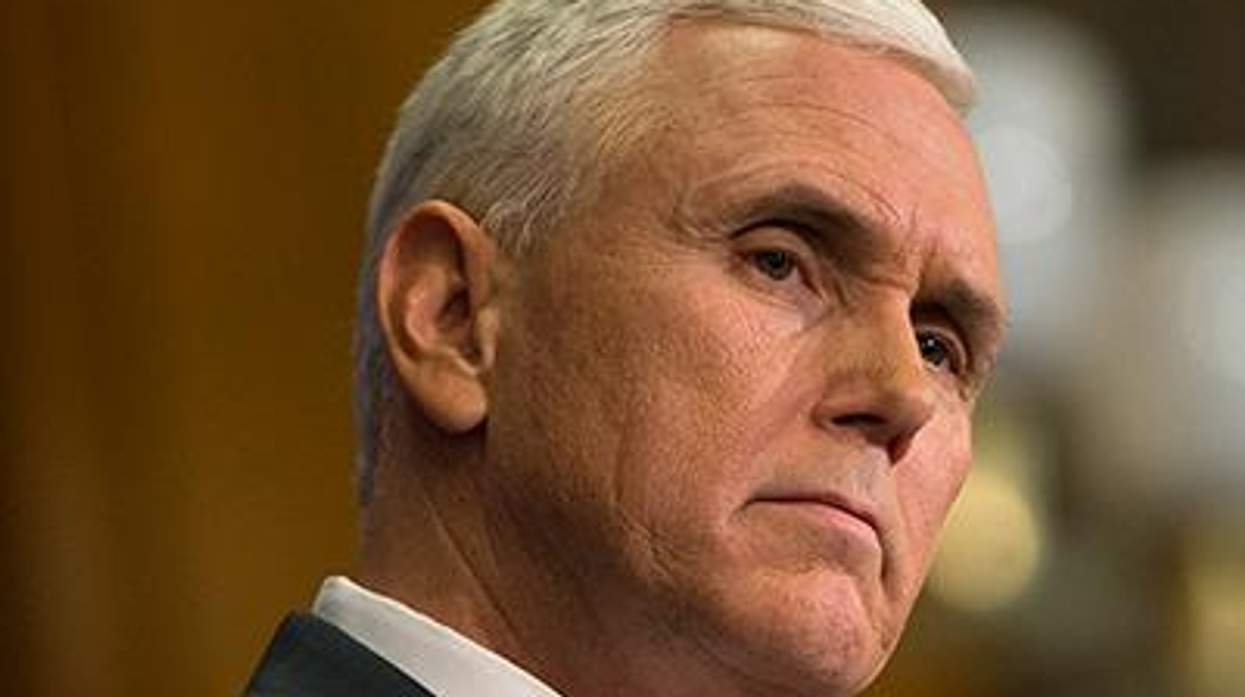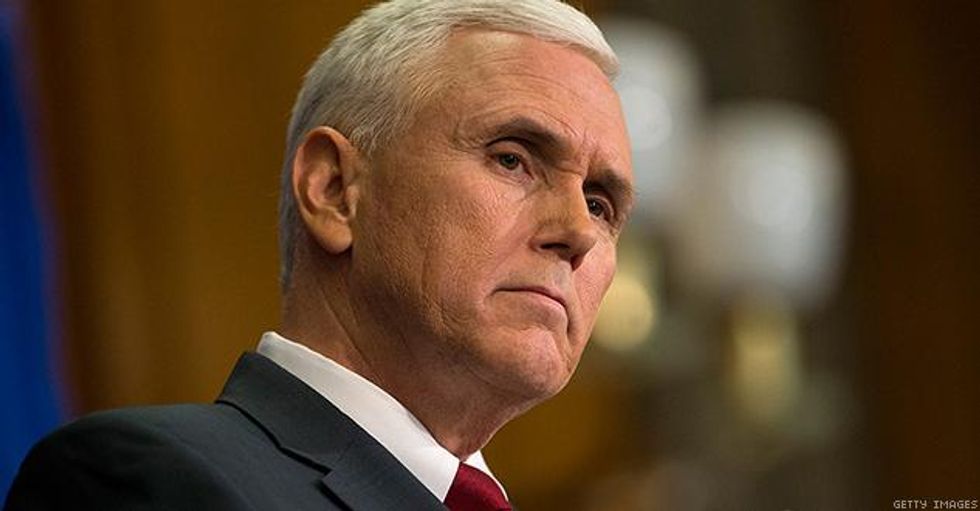
While mounting a defense of his state, Indiana Gov. Mike Pence repeatedly claims to "abhor discrimination" -- but his votes in Congress tell a different story, as do some of the words that accompanied them.
Pence has rankled many by signing into law Indiana's Religious Freedom Restoration Act, which goes much further than most other state RFRAs and their federal counterpart, allowing businesses and individuals to discriminate against anyone who offends their religious sensibilities -- for instance, LGBT people or members of different faiths. Pence contends the bill doesn't allow such discrimination, but legal experts beg to differ. And he has repeatedly asserted that he personally opposes all discrimination.
"I don't support discrimination against gays or lesbians, or anyone else," the governor said at a Tuesday press conference. "I abhor discrimination. I want to say this: No one should be harassed because of who they are, who they love, or what they believe. I believe it with all my heart."
He may indeed believe that. But he has repeatedly voted against legislation to prohibit discrimination or address its consequences.
Pence, a Republican, was a U.S. House member from Indiana for six terms, from 2001 to 2013, after which he became governor. During that time, he earned a solid zero from the Human Rights Campaign in its Congressional Scorecard, meaning he did not support any pro-LGBT bills or oppose any that would have a negative effect. Following are some of the positions he has taken.
Pence has consistently opposed marriage equality. The website for his 2000 congressional campaign (his first successful run), unearthed by The New Civil Rights Movement, carried this statement: "Congress should oppose any effort to put gay and lesbian relationships on an equal legal status with heterosexual marriage."
He was nothing if not true to his word. In 2004 he cosponsored and voted for an amendment to the U.S. Constitution to define marriage only as the union of a man and a woman. He voted for a similar amendment in 2006. Neither one passed -- federal constitutional amendments need the support of a two-thirds majority in both houses of Congress before going to the states for ratification -- and there have been no further votes. But Pence continued to speak out against marriage rights for same-sex couples.
"The future of conservatism demands that we stand for the traditional definition of marriage," Pence said at the Conservative Political Action Conference in 2008, according to the voter information site On the Issues. "Marriage was ordained by God and instituted in law. It is the glue of the American family and the safest harbor to raise children. Conservatives must defend traditional marriage by passing the Federal Marriage Amendment."
In 2013, when the U.S. Supreme Court gutted the federal Defense of Marriage Act, he expressed disappointment with the decision and pushed for Indiana to amend its own constitution to ban same-sex marriage. The state already had a statutory ban, and attempts to write that into its constitution failed. And after a federal appeals court struck down the statutory ban and the U.S. Supreme Court let that ruling stand, Pence was forced to acquiesce. "My position on this issue is very well known, but I believe in the rule of law," he said last October, when the Supreme Court declined to hear further appeals in the case.
Pence has also stood staunchly against protecting LGBT employees. In 2007, as a member of the U.S. House, he voted against the Employment Non-Discrimination Act. That year some representatives who would otherwise support ENDA opposed it because it included only sexual orientation, not gender identity, but that wasn't Pence's reason.
"By extending the reach of federal law to cover sexual orientation, employment discrimination protections, in effect, can wage war on the free exercise of religion in the workplace," he said in a speech on the House floor. He continued, "Some examples, under ENDA, would mean employees around the country who possess religious beliefs that are opposed to homosexual behavior would be forced, in effect, to lay down their rights and convictions at the door. For example, if an employee keeps a Bible in his or her cubicle, if an employee displays a Bible verse on their desk, that employee could be claimed by a homosexual colleague to be creating a hostile work environment because the homosexual employee objects to passages in the Bible relating to homosexuality."
His language was even stronger in 2000, on his campaign site: "Congress should oppose any effort to recognize homosexual's as a 'discreet and insular minority' entitled to the protection of anti-discrimination laws similar to those extended to women and ethnic minorities." (The spelling and punctuation are as they were on the site.)
Pence has not supported LGBT-inclusive hate-crimes legislation either. He opposed the Matthew Shepard and James Byrd, Jr., Hate Crimes Prevention Act of 2009 (passed by Congress and signed into law by President Obama); it added crimes motivated by the victim's actual or perceived sexual orientation or gender identity to the definition of hate crimes, and made federal government resources available to investigate and prosecute such crimes.
At the time, Pence said he objected especially to the measure being attached to a defense spending bill, but he had harsh words for the hate-crimes bill itself. "The president has used his position as commander in chief to advance a radical social agenda, when he should have used it to advance legislation that would unequivocally support our troops," he said, according to USA Today. But Pence has not supported lesbian, gay, and bisexual troops.
He opposed repealing "don't ask, don't tell." The Clinton-era law kept LGB people from serving openly in the military and resulted in the discharge of many well-qualified service members (transgender troops are still subject to discharge). "There is no question that to mainstream homosexuality within the active duty military would have an impact on unit cohesion, an impact on readiness," he told MSNBC's Chris Jansing in 2010, as repeal was being debated. In the same interview he said repealing the policy amounted to "using the American military, our armed forces, to advance a liberal social agenda."
Back in 2000, he had supported ending DADT, but for a different reason: He didn't want LGB troops to serve at all, even if they stayed closeted. "Homosexuality is incompatible with military service because the presence of homosexuals in the ranks weakens unit cohesion," his campaign website stated. Apparently, he would have gone back to the practice of actively rooting out LGB service members; DADT was supposed to end this practice but did not entirely succeed.
Pence won't say whether same-sex couples should raise children. The Indianapolis Business Journal was curious about that question back in September 2012 but never got an answer. When Pence ran for governor, "his campaign did not respond to questions about whether he would support two men or two women rearing children together," the IBJ reported at the time. Pence hinted that he at least considers straight parents superior when arguing in 2004 on the House floor in favor of a federal constitutional ban on same-sex marriage, saying that "Marriage is the glue of the family and the safest harbor for children."
Pence's stand on funding for HIV services has also betrayed some antigay bias. "Congress should support the reauthorization of the Ryan White Care Act only after completion of an audit to ensure that federal dollars were no longer being given to organizations that celebrate and encourage the types of behaviors that facilitate the spreading of the HIV virus," his 2000 website read. "Resources should be directed toward those institutions which provide assistance to those seeking to change their sexual behavior." It's not clear, notes The New Civil Rights Movement, if that last comment was an endorsement of "ex-gay" therapy.
Regarding HIV, Pence has long opposed needle-exchange programs to help prevent the spread of the virus among injection-drug users, seeing such programs as encouraging drug use. One Indiana county's recent spike in HIV cases forced him to temporarily change his stance, and he OK'd a short-term, state-supervised needle-exchange program for that county. "In response to a public health emergency, I'm prepared to make an exception to my long-standing opposition to needle exchange programs," he told The Indianapolis Star.
Now civil rights groups are pushing Pence to make an exception to his opposition to LGBT-inclusive antidiscrimination laws. Can he prove he really abhors discrimination? Stay tuned.





































































Charlie Kirk DID say stoning gay people was the 'perfect law' — and these other heinous quotes